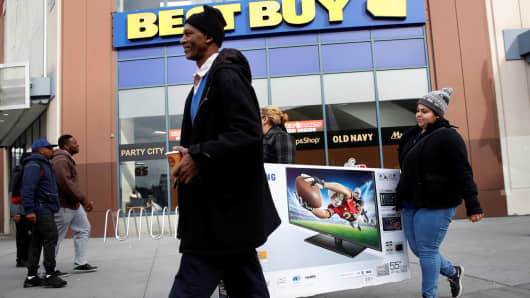The S&P 500 rose 0.39 percent on "Black Friday," the day after Thanksgiving when people kick off their holiday shopping — but history actually suggests that could be a bad sign for the 12 months to come.
According to data compiled by Kensho, a market analysis tool, stock market returns on Black Friday actually have a direct negative correlation for the year ahead. That means the more the market gains on Black Friday, the worse it will do over the following year.
Correlation is expressed as a number between -1 and 1. A correlation of 1 means the two figures always move perfectly in sync, while a correlation of -1 means that when one goes up, the other always goes down. The correlations between Black Friday performance and various, subsequent time periods are outlined here:






